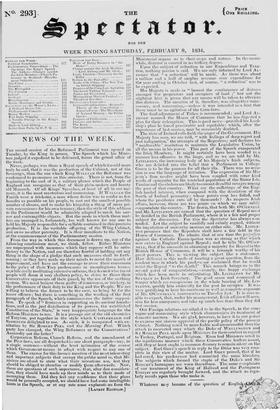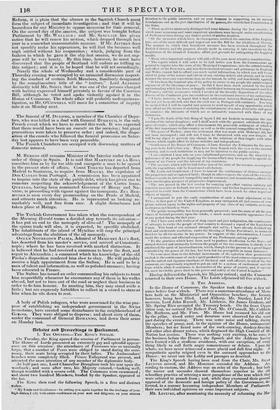NEWS OF THE WEEK.
THE second session of the Reformed Parliament was opened on Tuesday, by the King in person. The Speech which his Ministers judged it expedient to be delivered, forms the grand affair of the week.
Never, perhaps, was there a Royal speech of which it could more truly be said, that it was the production of the Cabinet, not of the
Sovereign, than the one which King WILLIAM the Reformer was condemned to pronounce on this occasion. There is not, from the beginning to the end of it, a solitary phrase which the People of England can recognize as that of their plain-spoken and hearty old Monarch. Of all Kings' Speeches, at least of all in our me
mory, it is the most mysterious and unmeaning. If WILLIAM the
Fourth were a trickster, a man whose desire was to confer as few benefits as possible on his people, to root out the smallest possible
number of abuses, and to make his kingship a thing of mere pri vate convenience for his own tenancy, then the style of this address to the Parliament would be admirably adapted to mask his nar
row and contemptible objects. But the mode in which these mat
ters are managed is, fortunately, too well known for any one to hold his Majesty responsible for a syllable contained in this precious
production. It is the veritable offspring of the Whig Cabinet, -and owns no other paternity. It is their manifesto to the Nation, at the commencement of the Parliamentary session.
From the way in which this document is drawn up, one of the following conclusions must, we think, follow. Either Ministers are unprepared with measures which they suppose will be satis factory to the Nation, and are therefore fearful of holding out any thing in the shape of a pledge that such measures shall be forth coming; or they have made up their minds to resist the march of improvement, and have not the courage to avow their conversion to the policy of their Tory predecessors in unambiguous terms;
or,w bile rea:ly meditating extensive reforms, tile) deem it wise (most
people will deem it very shallow) policy, to strive to throw their Conservative opponents off their guard, by the use of the soothing system. We must believe them guilty of remissness, or trickery, in the performance of their duty to the King and the People. We are willing to believe the former to be the ease, as being by far the lesser offence; but there is something in the wording of the first
paragraph of the Speech, which countenances the latter supposition. To speak of" firmness in supporting on its ancient founda
tions, and in the just distribution of its powers, the established
Constitution of the State,' is very inappropriate language for the Reform Ministers to use. It is a passage out or the old chronicles of Toryism, put together in the style which C ASTLEREAGH and SIDMOUTH delighted to use. As such, it is recognized with exultation by Sir ROBERT PEEL and the Morning Post. Which party has changed, the Whig Reformers or the Conservatives? Assuredly not the latter?
Corporation Reform, Church Reform, and the amendment of the Poor-laws, are all despatched in one short paragraph—nay, in
a single sentence—without the least intimation of the course which Government means to adopt with respect to any one of them: The excuse for this lacoMc mention of the most interesting and important subjects that occupy tile public mind is, that Ministers are afraid to state what their intentions are, lest they should be obliged to abandon or modify them afterwards. Now, these are questions of such importance, that, after due consideration, they should have made up their minds as to their mode of managing them. Did they feel any cenfidence that their plans Would be generally accepted, we should have had smile intelligible hunts in the Speech, or at any rate some explanatiens from the [LATEST EDITION.] Ministerial organs as to their scope and nature. In the meanwhile, distrust is created in no trifling degree. Upon the subject of reduction in our Expenditure and Taxation, nothing precise is said. We are only informed by Lord AL 'Ilion it that " a reduction" will be made. As there was about a million and a half of surplus revenue over expenditure for the year ending in October last, of course, " a reduction" was to be expected.
His Majesty is made to " lament the continuance of distress amongst the proprietors and occupiers of land ;" but not the
slightest hint is given that any means will be taken to alleviate this distress. The mention of it, therefore, was altogether unnecessary, and unmeaning,—unless it was intended as a hint that there must be no agitation of the Corn-laws. The final adjustment of Tithes is recommended ; and Lord ALTHORP assured the House of Commons that lie has digested a plan for their redemption. This is good news—provided his Lordship's plan be found practicable and equitable; which, after the experience of last session, may be reasonably doubted.
The state of Ireland calls forth the anger of the Government. II is Majesty has seen, we are told, " with feelings of deep regret and
just indignation," the attempts of the Repealers; and declares his " unalterable" resolution to maintain the Legislative Union, by all the means in his power. This part of the Speech exasperated
the Irish Members. It might certainly have been worded in a
manner less offensive to the large, and as we are told by Mr. LITTLETON, the increasing body of his Majesty's Irish subjects,
who are deluded into the belief that a Parliament in College
Green is to be the panacea for all their ills. There was no occasion to use the language of irritation. The expression of his Ma jesty's firm resolve might have been coupled with some kind
words of sympathy for the wretched population of the Sister Isle. Famine and thecholera are likely tocommit dreadful ravages among the poor of that country. What are the sufferings of the Eng lish landed interest, when compared with the desolation of the South of Ireland peasantry ; whose potato crop has failed, and whom the pestilence cuts off by thousands? As respects Irish
affairs, however, there are two points on which we may safely congratulate the country. The first is, that both Mr. O'CoNNELL
and Mr. LITTLETom are agreed that the question of Repeal must
be decided in the British Parliament, where it is a fair and proper subject for discussion. For this the Spectator has always coil
tended. Let the subject be candidly and calmly argued, without
the imputation of unworthy motives on either side. Mr. LerrLETON promises that the Repealers shall have a fair field in the
House of Commons. He admits that at one time the prejudiee
against the Catholic Emancipation was as strong as that which now exists in England against Repeal ; and he tells Mr. O'CoN NELL, that if he succeeds in obtaining a majority for Repeal in the
British House of Commons, it will be a triumph worthy of his great powers. This is viewing the subject like a statesman. How different is this mode of treating a great question, from the
insolent tone in which his predecessor exclaimed that he would resist the Repeal " to the death!" This remark brings us to the second point of congratulation,—namely, the happy exchange which has been made in substituting Mr. LeiTeEToN for Mr. STANLEY as Irish Secretary. The good sense and command of temper which are conspicuous in the whole bearing of Mr. LIT TLETON, qualify him eminently for the post he occupies. It was very gratifying to hear his courteous as well as complete exposure of Mr. O'CONNELL'S inaccuracies on Tuesday last. It is reasonable to expect, that, tinder his management, Irish affairs will occasion far less annoyance, and take up much less time than they did last session.
Our Foreign relations are alluded to in the Speech, in the same vague and unmeaning style which characterizes its treatment of domestic matters. We are glad, however, to have it in our power to express our sincere approval of the pacific policy of' the present Cabinet. Nothing could be more feeble and unsuccessful than the attack (a concerted -one) which the Duke of WELLINGTON and Sr ROBERT PEEL made upon Ministers for their conduct in regard to Turkey, Portugal, and Belgium. Even had Ministers acted in the injudicious manner which these Conservative leaders assert, still they at least ought in common decency to remain silent on the subject. Earl GREY'S speech in reply to the Duke was very complete in this view of the matter. Lord GREY proved, that if he bad erred, his predecessor had committed the same blunders. The subjects which formed the Etaple of the Duke's and Sir RoniatT's harangues are worn threadbare. The same complainta of our treatment of the King of Holland and the Portuguese Usurper are regularly brought forward, and the attack as regularly recoils upon those who make it.
Whatever nny become of the question of Englis4 Reform, it is plain that the abuses in the &fattish Church must form the subject of immediate investigation ; and that it will be hazardous for any Ministry to oppose measures for their removal. On the second day of ,the. session, the subject was brought before Parliament by Mr. WALLACE; and Mr. SINCLAIR has given notice that he will renew his motion, which dropped through last year in a somewhat unaccountable manner. If Mr. JEFFREY does not speedily make his appearance, he will find the business well nigh settled without his cooperation ; which, judging from the fashion in which he gave it the slip last session, we do not suppose will be very hearty. By this time, however, he must have discovered that the people of Scotland will endure no trilling on this subject ; and it is to be hoped that he will act accordingly. Nearly the whole of Wednesday and a considerable Fart of Thursday evening was occupied by an animated discussion respecting the conduct of certain Irish Members, familiarly designated by the complimentary title of the " traitors." Lord ALTHORP distinctly told Mr. SHELL that he was one of the persons charged with having expressed himself privately in favour of the Coercion Bill, although he voted and spoke violently against it in the House of Commons. The whole affair will probably undergo investigation, as Mr. O'CororaLL will move for a committee of inquiry into it on Monday next.



















 Previous page
Previous page